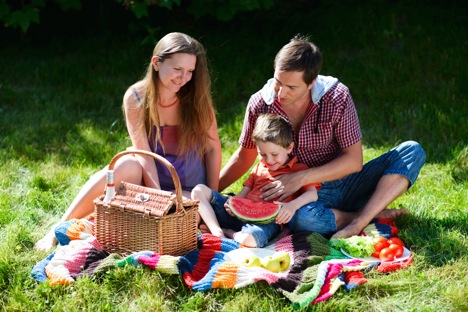
Families in India and Russia share a great deal in common.
Alamy/LegionMediaTraditionally, families in India and Russia share a great deal in common. This could have something to do with the fact people in both countries have had to adjust to life in larger and joint-families for a very long time.
There are, however, humorous situations that tend to arise from the differences in mentalities and what’s acceptable in different cultures. These come out into the open more in “mixed” families, where at least two different cultures merge.
I vividly remember celebrating my mother’s birthday with our big Indian family once. My Ukrainian mother looked surprised when my father’s Indian relatives brought a birthday cake into the room. There was nothing that unusual about the cake, but there was her age was given on the icing. She was of course delighted to receive such warm greetings on her special day and we had a great party, but her initial reaction had roots in the attitude towards age in Ukraine as well as Russia, which is different in certain parts of India.
In Russia, it’s considered ‘mauvais ton’ (unacceptable in polite society) to mention the age of an adult, especially a woman. It is regarded as impolite to ask a lady how old she is. Much like the case in urban India these days, in Russia the age of the birthday woman is usually not dwelt upon (unless the lady in question is very young or has chosen herself to put the focus on her age, which is very rare).
I think the reason for this lies in a less comfortable attitude towards ageing in Russia, where ripe age nowadays unfortunately is often associated with ailing health and lower living standards, compared to India, where older age is traditionally linked to maturity and wisdom and treated with reverence.
A common trait in the Indian and Russian mentality is that elderly members of the Indian family as well as Russian ‘babushkas’ and ‘dedushkas’ (grandmothers and grandfathers) take an active part in bringing up the younger generation. Extended families are popular here, as opposed to the West which prefers nuclear families and keeps relationships pleasant but a bit distant.
Speaking of families, I have often been to Indian and Russian homes and seen how the children behave. I think there is a significant difference in their behavioural tendencies and the level of expression.
From my experience, I think Indian children tend to be very outgoing and confident, they easily start conversations with the guests at a house party and, when asked questions, give eloquent monologues. Meanwhile, Russian children tend to shun communication if they don’t know a person well enough and are prone to behaving timidly and nervously in company. I thought this might have something to do with energy and self-confidence my Indian peers displayed in various situations, in particular, in studies and at work, the ease with which they asked questions and expressed their opinions freely without fear of saying something wrong.
I have observed different people, of Russian and non-Russian descent, but raised in a Russian environment, and noticed the same patterns as in their childhood. They were afraid of asking questions and of sticking out of the crowd. Maybe it can be rooted to the models of behaviour in Indian families with children being thrown out in the crowd of guests and left alone to develop communication skills. In Russian families, parents try to protect their children from literally everything and thus make them insecure and ill-adapted socially.
However, there is a hidden risk in this openness among Indian children. In this day and age, there are a lot of hazards awaiting those who aren’t wary enough and, sometimes, being too naïve and trusting can turn into a problem for children who don’t have enough warning against treacherous people and dangerous situations.
Another difference between raising children in India and in Russia is that a lot of Indian children focus on their studies from the word go and later pursue their career with similar zeal, while their Russian counterparts are not to that extent focused on schooling, although education is one of top priorities for Russian parents as well.
As one of the most populated countries in the world, there is a tough contest in India for the best school, college or job. Therefore, being competitive is a must for succeeding in life. In Russia, with the population decreasing, the situation is different and, in certain years, there were universities facing a lack of students in some courses. And despite the initial emphasis on the role of education during the Soviet era, education is not considered as important nowadays as it used to be. Besides, in contemporary Russia, there are enough opportunities to engage in business activities and do other kind of jobs without necessarily obtaining a degree from a prestigious university. All it takes is a flair for business and an ability to “sell yourself,” as job interviews require.
Within family life, there are some things which are very similar in our countries, hospitality and generosity being foremost among them. For a Westerner it may seem strange to treat a person who came for a casual visit to a sumptuous dinner or to invite the whole village to a wedding. For a Russian or an Indian, this can be the most natural thing in the world to share their big day with all the neighbours or to neglect formalities even in such formal situations.
This is not something that our Western friends would easily be able to comprehend.
The article was first published in 2013.
All rights reserved by Rossiyskaya Gazeta.
Subscribe
to our newsletter!
Get the week's best stories straight to your inbox